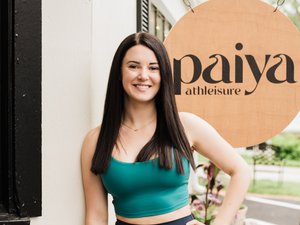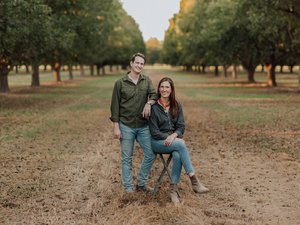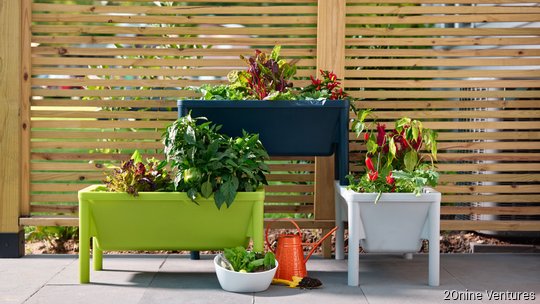
A Conshohocken branding agency is looking to scale its container gardening product with the goal of raising $150,000 to $200,000 in Series A funding by the end of this summer.
Currently considered in beta mode, the funding will go toward giving Harvi Garden a bigger market share and launching new products and programs as the brand looks to make container gardening accessible to a larger segment of the population.
Launched in 2022, Harvi is a modular container garden designed for those with limited space. It has a self-watering feature and is made from food-safe and BPA-free materials. Its differentiator, however, is the ability to configure multiple units in numerous ways.
“It’s sort of like a Lego of garden,” said Jason Weidner, who co-created Harvi with Greg Ricciardi.
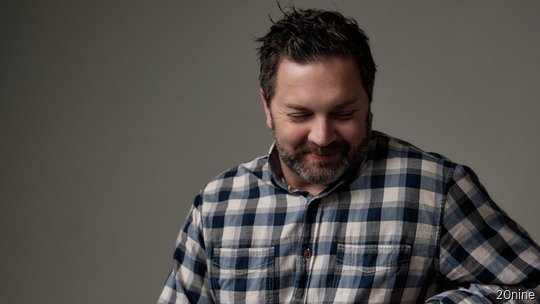
A single Harvi Garden, which retails for $185, measures 31.5 inches long, and 15.75 inches tall and wide. The unit – currently available in five colors – comes with legs that allow Harvi units to be stacked and arranged.
Three units can be stacked and anchored to a wall or railing. To heighten a unit, Harvi has matching extender legs which add another 15.75 inches of height. A set of four retails for $60.
The modular design means each consumer can maximize their space and therefore their garden yield. Users assemble Harvi and then plant their desired crops, such as vegetables, herbs, edible flowers or fruits. Holes along the top edge allow for filling of a reservoir so plants can go unattended for short periods of time. Harvi holds about 1.5 gallons of water and can water plants for one to two weeks.
A low yield and lack of configuration capabilities was a point of frustration for Weidner and Ricciardi, who had both tried their hand at various forms of gardening before. The pair came up with the idea for what would become Harvi several years ago but began homing in on it after they connected with a product engineer in Ireland who was also making food-safe raised gardens.
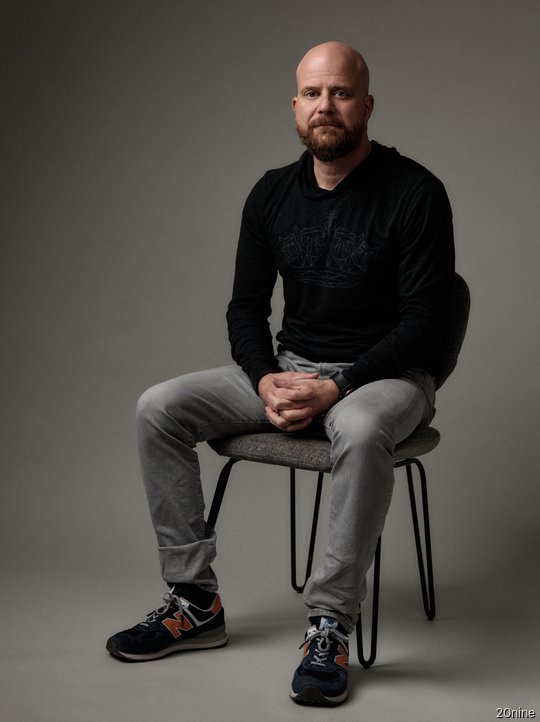
Duncan McInnes conceptualized the raised container for his mother, who had a passion for gardening but little space in her retirement community, Weidner said. Together they built out the concept, which launched last spring.
The name, a play on the word harvest, was chosen to give it some semblance of character. “We wanted to personify the product,” Ricciardi said. “It's an inanimate object, but we wanted to create a connection between the consumer and one of the best ways to do that is to create a persona for it.”
Edible gardens have been on the rise for years, but the Covid-19 pandemic accelerated the trend. Data from the National Gardening Association found that in 2008 about 31% of American households had a food garden, a figure that has jumped to 35%, or an increase from 36 million to 42 million households today. Despite the increase, gardening remains largely relegated to certain subsets of the population. Namely, older, college-educated individuals are the primary American food gardener.
Weidner and Ricciardi wanted to expand that to make the practice more inclusive by creating configurations that better fit more spaces.
“The core purpose here is to help people that have limited space,” Weidner said, noting Harvi is not geared exclusively toward city-dwellers, but rather those who simply have limited outdoor space.
Its self-watering feature also makes it approachable for those new to gardening.
In addition to space limitations, container gardening also addresses soil issues and Harvi has been proving popular on the West Coast and in parts of the Southwest where the conditions are more desert-like.
Harvi is made in Wisconsin using rotational molding, or rotomolding. Because the product is fairly heavy – a unit weighs 15 pounds – they sought a manufacturer in the Midwest so they could more cost effectively ship to both coasts.
Harvi is available direct-to-consumer as well as on marketplaces like Amazon. Weidner and Ricciardi are currently working to establish a more robust retail presence. Because Harvi comes in multiple colors and has different components, the goal, Weidner said, is to launch something more akin to an affiliate program where a retailer would have on-site models accompanied by a QR code from which a consumer could order and have the product shipped to their door. In return, the retailer would earn a commission.
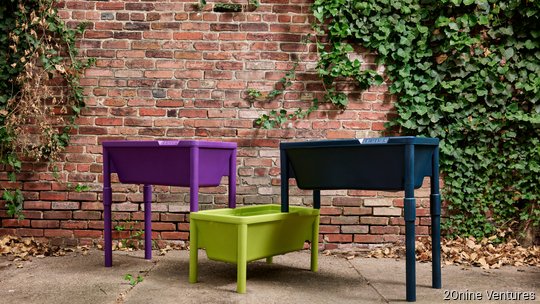
They plan to roll out that model shortly to a selection of small businesses in the region, such as FarmerJawn Greenery in Germantown.
At present, the average order value for Harvi Garden is north of $400 and Weidner said the business is seeing recurring revenue from customers who want to add units to their existing setup.
As they build out Harvi’s place in the market, Weidner and Ricciardi are also turning their attention to the next phase of edible home gardening. That includes a new model which will be largely made from plant-based material, as well as an indoor version.
To develop the indoor version, they are working with Boonton, New Jersey, company Dive, which was founded by alums from Philadelphia University – now part of Thomas Jefferson University. They see that model being a more cost-effective alternative to the high-tech versions currently on the market, some of which retail for upwards of $700 to $900.
“We sort of see Harvi as this lo-fi thing. There's no wires to it, it is an easy to use, pretty simple product,” Weidner said.
They’ve developed a prototype but don’t have a timeline for when an indoor version might come to market.
As an extension of their mission to make gardening more accessible, they also plan to launch a program called Give a Crop later this year or early next year where home food growers can give away or sell their excess yields. In addition, they foresee it being a space for knowledge sharing. “We really want to be able to connect Harvi owners together to be able to do this more effectively,” Weidner said.
Harvi Garden isn’t Weidner’s and Ricciardi’s first foray into consumer goods. The pair launched Fend Wellness, an antibacterial hand wipe in the shape of a mitt, in early 2021. Both brands were launched by their 20nine Ventures, a product development incubator that is part of Conshohocken-based creative agency 20nine, through which they funded Harvi. Ricciardi founded 20nine about two decades ago and acquired Weidner’s firm Nucleus Brands in 2018, which was the iteration of what is today 20nine Ventures. In addition to Fend Wellness and Harvi, they are embarking on a third product launch focused on pets.
